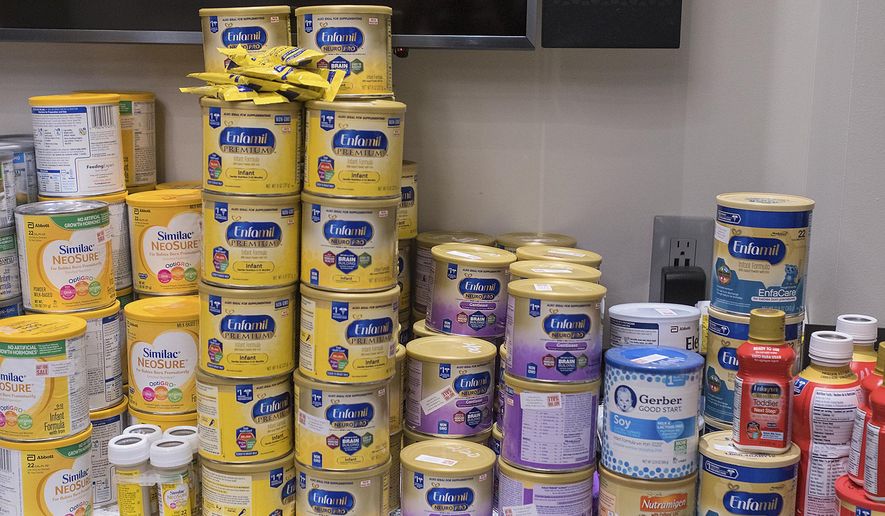Infant formula distribution is back to pre-pandemic levels but the nation’s three dominant producers have cut back on some varieties, leaving bare spots on store shelves and frustrating some parents more than a year after a severe shortage crippled the industry.
“Shelves won’t look the same,” said Frank Yiannas, who last month left his job as deputy commissioner at the Food and Drug Administration, which oversees the infant formula market.
Mr. Yiannas told lawmakers at a House oversight hearing Tuesday that when he departed the FDA last month, the agency had recorded shelves stocked with infant formula at roughly 90%, which he said aligns with pre-pandemic levels.
The latest figures are a drastic increase from a low of roughly 60% during the pandemic when infant formula availability plummeted amid supply chain issues, a massive recall of popular infant formula and a subsequent shutdown of one of the nation’s largest formula-producing plants. The series of events triggered a run on supplies by panicked parents, worsening the shortage.
Despite the 90% stock rate, shortages persist.
The report from Mr. Yiannas about limited varieties follows complaints from parents seeking specific specialty formulas that continue to be hard to find in some areas.
“Manufacturers are producing a high volume of certain types,” Mr. Yiannas said. “As a nation, we’re producing more infant formula than ever before. But variety has been reduced.”
Formula shortage groups remain active on social media and mothers continue to plead for help in finding some varieties of formula.
A mother in Idaho Falls, Idaho, connected on Facebook recently with a Colorado woman who was willing to sell her a tub of hard-to-find Enfamil Inspire Optimum for infants.
“I’m in serious need of this formula please we are running out and I can’t find it,” the mom posted.
In Florida, mothers are posting photos of stocked store shelves on a Facebook formula shortage page and alerting fellow moms to the locations. But some mothers are still coming up short.
Parents are having trouble finding hypoallergenic formulas and some toddler varieties.
One Tampa-area mother put out a request last week for Nutramigen Toddler, an iron-fortified, hypoallergenic variety.
“I’ll pay anything!” the mother posted, eventually receiving an offer from a woman willing to sell some of her supply.
Reckitt/Mead Johnson, which produces Nutramigen and Enfamil, did not respond to specific questions from The Washington Times about continued shortages of some of their formulas.
Reckitt recently raised prices on some formulas, blindsiding some parents already frustrated with the struggle to find certain brands.
In a statement to The Times, an unidentified spokesperson said the company had to hike prices in February to make up for “unprecedented cost inflation impacting all companies.”
The spokesperson said the price of major formula ingredients jumped 60% in 2022.
“We understand the cost-of-living pressures parents face and only look to pricing adjustments as a last resort,” the spokesperson said. “We will continue to do everything possible to limit any further increases.”
Most of the nation’s formula is produced by Reckitt, Abbott Nutrition and Gerber.
The House Oversight and Accountability Committee on Tuesday held a hearing on the FDA’s oversight of the highly consolidated market and the chain of events that led to last year’s crippling formula shortage.
The GOP-led panel criticized the FDA for failing to swiftly handle a credible report about significant sanitation and safety problems at the nation’s largest formula plants, run by Abbott Nutrition and located in Sturgis, Michigan. Abbott was forced to recall Similac formula, its most popular variety, after two infants who consumed the formula died and two others became ill.
The tainted formula was produced at the Sturgis plant which the FDA said contained cronobacter sakazakii bacteria.
Abbott was forced to shutter its plant for months. The plant began operating again in August but is now facing lawsuits and is under investigation by the Justice Department.
The FDA was slow to respond to the problems at Sturgis in part because a whistleblower report from a former employee at the plant, sent to FDA officials by mail and email, was somehow lost along the way and wasn’t seen by top agency officials for months.
The FDA had also cut back on plant inspections during the pandemic.
Abbott’s closure of the Sturgis plant, the Similac recall and pandemic-related supply chain problems created a shortage that prompted the Biden Administration to launch Operation Fly Formula to import infant formula from other countries.
The FDA produced an internal review of its botched handling of the formula crisis that included a “roadmap” to improve its emergency response capabilities.
Republicans are not satisfied with the FDA’s response and have summoned current FDA officials to an April 19 follow-up hearing.
“They failed to react quickly to reports of the cronobacter infections, they failed to conduct an objective internal review, and they failed to take ownership of their actions,” said Rep. Lisa McClain, a Michigan Republican and chair of the Oversight committee’s health care panel. “Now they are trying to hide behind a weak proposed restructuring plan to distract from their failings and deflect blame.”
An FDA spokesperson did not respond to a request for a comment about the criticisms.
Abbott Nutrition declined several requests for an update on its formula production. Company officials have denied accusations that its formula sickened the infants and said the specific type of bacteria that caused the illnesses did not match bacteria found in the Sturgis plant.
Mr. Yiannas told lawmakers the gaps in formula stocked on store shelves will end soon but didn’t elaborate. Explaining the store shelf gaps, Mr. Yiannas said formula companies are limiting the assortment they produce so they can focus on getting more widely used formulas back on the shelves.
“So store shelves will still look scarce,” Mr. Yiannas said. “There’s less variety, but I think in short order, we should find ourselves in a very much better situation.”
• Susan Ferrechio can be reached at sferrechio@washingtontimes.com.




Please read our comment policy before commenting.